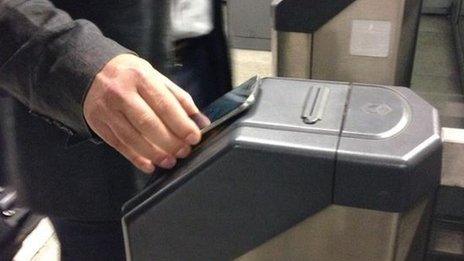Contactless payments arrive on the Underground network
- Published

Contactless bank cards are being introduced across London's Tube, DLR and Overground train networks.
From Tuesday, people can use their bank cards instead of having to top up their Oyster Cards, although these will still be accepted.
Commuters have been urged to avoid paying twice in "card clash" by making sure only one card touches the reader.
Contactless payments work in the same way as the Oyster cards by touching in and out on card readers.
Transport for London (TfL) will accept all UK-issued contactless American Express, MasterCard or Visa credit, debit, pre-paid or charge payment cards.
Only one payment will be sent to the bank or financial provider for payment.
Payments will be subject to daily capping - when travellers taking multiple journeys will not pay more than the cost of a Day Travelcard - but a new Monday-to-Sunday cap is also being introduced for those using contactless cards with the best value over the course of the week automatically calculated.
Other methods of contactless payment that meet financial industry standards, including mobile phones, may also be accepted, with users of the EE network able to pay via the Cash on Tap app.
Some non-UK cards may not be accepted and cardholders have been advised to check with their issuers.
Contactless payments have operated on London's bus network since December 2012 and by July had been used by about 825,000 customers for 17 million journeys.
TfL's introduction of contactless payment for rail journeys follows a trial in April involving about 5,000 customers.
Caroline Pidgeon, leader of the Liberal Democrat London Assembly Group, said the new system was only desirable so long as travellers did not lose out on payment caps by using other methods, such as Oyster pay-as-you-go (PAYG).
"There are still hundreds of thousands of households who have no access to a bank account and therefore rely on Oyster PAYG whenever they travel," she said.
The system's introduction is one-year behind Mayor Boris Johnson's original schedule, outlined in his 2012 Transport manifesto.
TfL said the delay was due to implementation in phases, while it also had to work with the card payment industry to create the technology used.
- Published25 July 2014
- Published6 July 2014
- Published29 April 2014